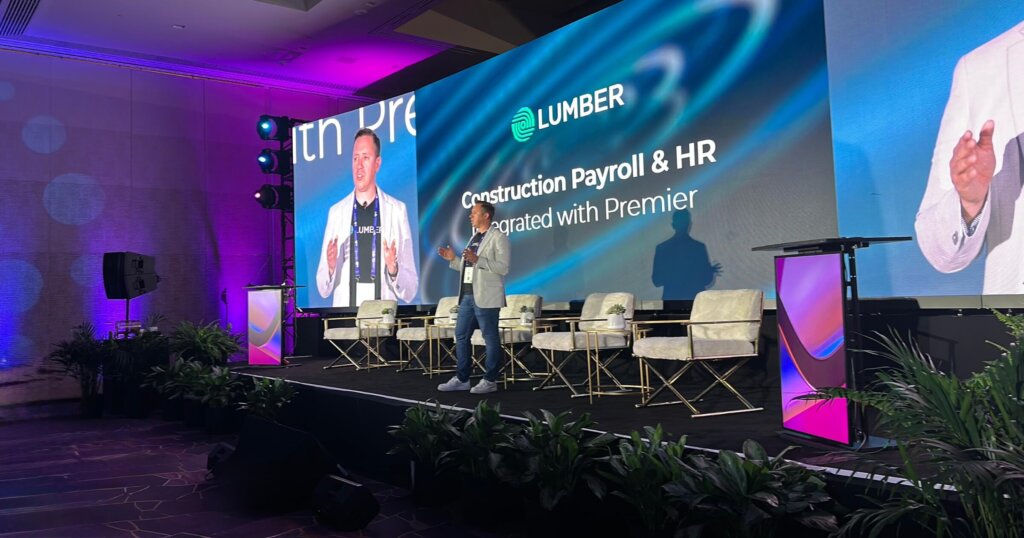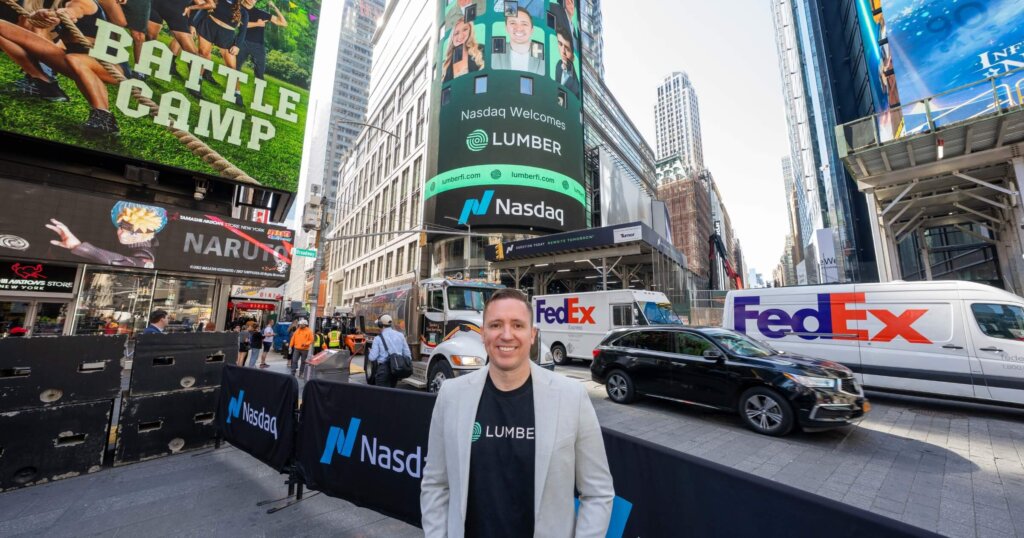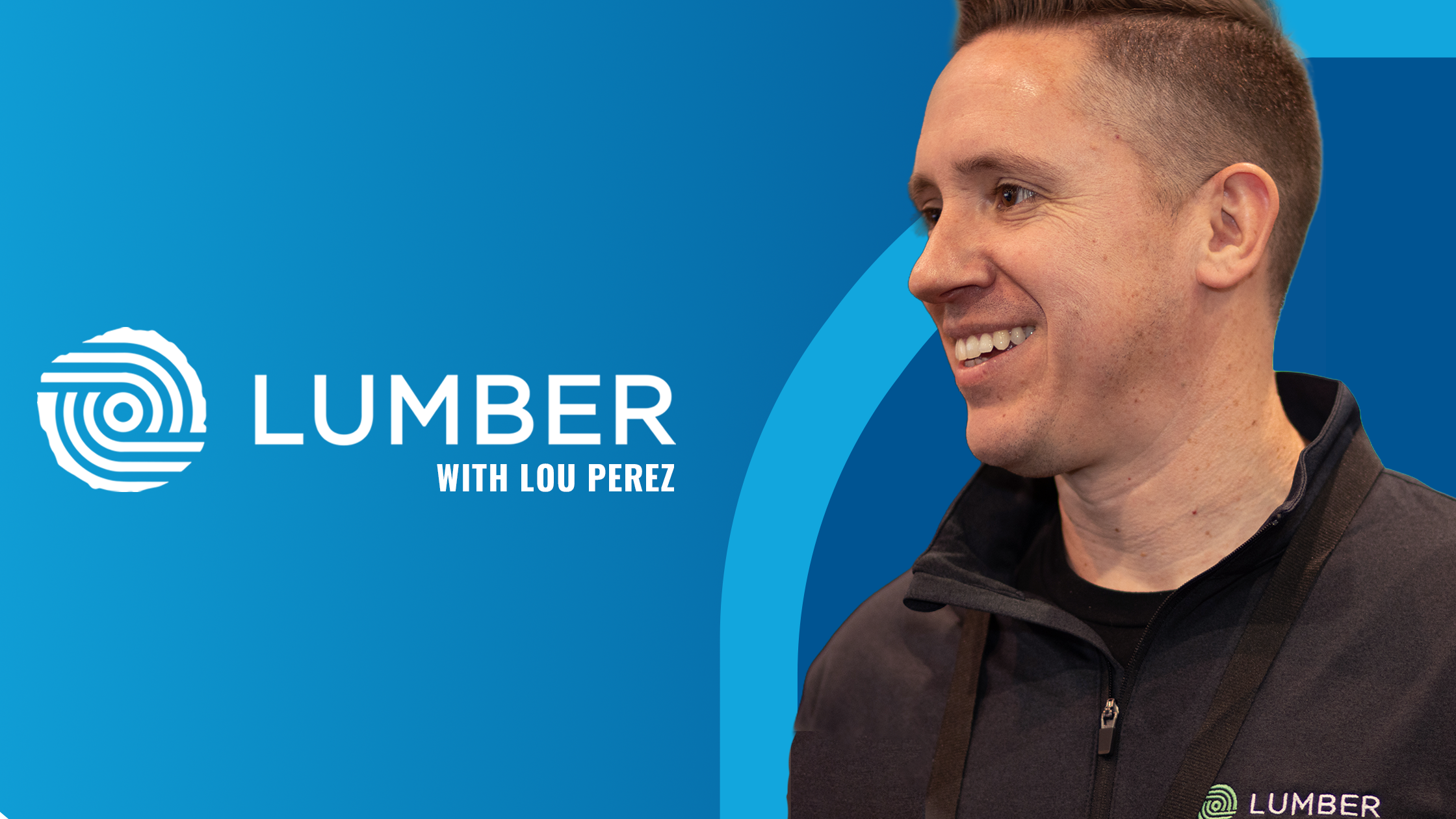The construction industry is experiencing a rising project demand and a widening labor shortage. That, combined with outdated backend processes, creates a recipe for stalled projects and businesses that fail to scale. That’s where Lumber comes in.
Lumber is an all-in-one workforce management software specifically tailored for the construction industry. Under the Hard Hat’s content contributor, Mariah Moore, sat down with Lumber Co-Founder Lou Perez to talk about why the industry needs a tech upgrade and what Lumber can do to streamline businesses. The future of construction, thanks to Lumber, looks smarter and faster.
This article has been edited for clarity and conciceness. To see the full interview, check it out on our YouTube Channel.
UTHH: What inspired you to pursue a career in construction tech, Lou?
Lou: I started out as a carpenter at a company in Illinois and worked my way up to a project manager. My whole family came from construction, agriculture, and farming. We used to have like 800 acres on the Idaho and Oregon border. Blue-collar work was just built into my bloodline.
It’s just, it’s close to the heart. I was also learning about what could be more efficient from an operational standpoint. Were we using technology to the fullest extent?
This led me to an opportunity to work in technology, grow a technology company, and ultimately sell it. It gave me a lot of experience with challenges as an entrepreneur, growing and starting a company. Those roadblocks and speed bumps you might hit along the way gave me a lot of experience.
UTHH: When you came together with the other founders at Lumber, was it a particular tech pain that you wanted to address? What did that look like?
Lou: So the pain really came down to the requirements for construction companies regarding payroll. So, a lot of the time, what happens is that they’re not having pre-construction meetings to learn about the classifications, the jurisdictional boundaries involved in that project, and the proper wage rates for those classifications.
And what happens if they’re not properly allocated to payroll for the certified payroll? There can be fines when companies get audited. With that side, we’re helping with compliance. Also, whenever they have a new accounting process, instead of utilizing technology, they just put one more person on it, which is so inefficient.
The other pain point is the adoption of technology in the field. There’s a lot of clunkiness in the apps that are out there. These are the companies that build without talking to contractors. Our app is beautiful. It’s clean. We make it less clicks, but more power in getting the data from the field to the back office.

Photo courtesy of Lou Perez and Lumber.
UTHH: It’s amazing how much something as simple as design and user friendliness can impact the implementation process for the long term. Before we get too into the weeds with the tech, what is Lumber, and what is the mission?
Lou: So Lumber is a workforce management platform built specifically for construction. We have different modalities built into the platform that are payroll, time tracking, HR, onboarding, applicant tracking system, and benefits administration.
There’s so much depth to each module. We are using AI across different modules to determine who’s the best fit to work on that task based on licenses, certifications, and proximity, for example.
What’s neat about AI is that it learns behavior. So the behavior of a scheduler, for example, AI can understand that over time, and then eventually just schedule for them. And all they’re doing is playing coach. So if somebody is sick or out of office, they can pull them out and put somebody in. And it’s really that simple. We’re doing more with AI to make things completely automated, almost to the point where they don’t need much human oversight.
UTHH: I’m curious to know. Why do you think the construction industry has historically been so slow to adopt new technology? What are they afraid of, Lou?
Lou: That’s a great question. So, as far as what they’re afraid to adopt, it’s really just the experience. So we offer a crawl, walk, run approach for contractors. Everything is à la carte. So if they just wanted to try some of the technology, like time tracking, for example, they can.
It comes down to the relationships with companies like ours, like partnering with Lumber to help out with the technology. We actually do free tech stack reviews and evaluate the current software, even if they are not looking at Lumber as a potential software provider for them.
UTHH: I’d love to talk a little bit about the AI piece. Was it something that Lumber adopted early, or is it a more recent advancement to the tool?
Lou: We’ve always had AI on our minds. There was a company competing against OpenAI, which was trying to create ChatGPT first. We ended up acquiring that company and bringing them in-house. And they’ve developed some amazing tech.
We have things like automated anomaly detection and Lumber Track AI that warns you about payroll errors. It’s like there’s a little AI guy in the background at Lumber, running around and figuring out what needs to be fixed. We actually named our AI bot Ila. So it’s I-L-A. It stands for Intelligent Labor Assistant.
So many companies say that they’re an AI company. And, you know, it’s like an overly dramatic chatbot offering from them. It’s nice, but it’s not that powerful. So, using AI to really automate the most serious compliance pieces of business? That’s what we’re in it for.

Photo courtesy of Lou Perez and Lumber.
UTHH: So it’s actual tactical business help versus just a simple offering. Has Lumber ever had any pushback around AI?
Lou: We actually do speaking engagements for Associated Builders and Contractors of America and we educate contractors on AI and how that works in construction. One of the main talking points within that piece is security. How does it work? What should companies look for?
We have small language models where it’s almost like a siloed account that’s collecting the data and then only returning it based off the information that you provide. So having a company like ours that’s SOC 2 type 2 compliant at the highest level of security. We work with DOD contractors, and we’re also CMMC compliant.
And being that highest level of security, we’re the kind of company that you want to trust to not just work with and have AI, but can also ask questions. We provide guidance to contractors that might not have the information that they’re looking for, and we need to hear it from the companies that are in the weeds.
UTHH: I would love to talk about Lumber success stories. Were there any notable stories that made the team think, “This is really working for people”?
Lou: I have had contractors come to me and they were completely fatigued from the processes that they have in place because they’re all manual. I also have had contractors come to me that are fatigued from doing way too many tech demos from other companies out there that try to position themselves as a construction solution when really, they’re a mainstream provider. More often than not, a mainstream provider’s offerings just don’t align with the industry.
These broad solutions don’t support the problems specific to the construction industry, especially around payroll. Those were some of the first success stories we saw, and it is still a big reason why companies and contractors come to us.
UTHH: I love how much Lumber gives contractors a seat at the table. Once somebody signs on to Lumber, what does the Lumber contractor relationship look like?
Lou: We build trust and personal relationships with teams. As soon as a contractor signs up with us, we have a kickoff meeting where they’re introduced to their customer success manager. That CSM is their point of contact where anything they need, they have a direct source for information to gather from. They also project manage the entire relationship where they’re setting up trainings, implementation, onboarding, everything.

Photo courtesy of Lou Perez and Lumber.
That CSM has a backup person. That backup person has a whole team. So if there is anything additionally required, contractors always get it fast. Our clients also have direct connections to the top of leadership. And we do that on purpose. Some people say it’s crazy, but we keep those channels open for feedback, so we can keep making Lumber even better.
UTHH: The door was open for contractors from day one and it continues to stay open! Well, just to wrap it up Lou, I’d love to hear about where people can learn more about Lumber, but also what’s next for the company.
Lou: I’ll throw out there lumberfi.com. Go hit us up, contact us. Everybody’s open to email me directly. It’s lou@lumberfi.com. You can use that email to connect with me on LinkedIn and then also follow everything that we’re doing.
There is a lot of exciting things coming up for Lumber. Our next releases are going to be in line with enhancing more capabilities for the service folks and then the field guys. I can’t tell all now, but more to come.
I also run a podcast called The Builder Upper Show, featuring construction owners, sharing what they do, and where they’re at today. It’s really in line with the Lumber mission. With anything we do, we’re in it to listen to real people and make a huge impact.
Loved this spotlight on Lou Perez and the great work at Lumber? Check out some of Under The Hard Hat’s other company spotlights!
- Tia Perry and AEC Unites: Empowering Black professionals in construction
- From project manager to business owner: Alisa Bailey on building a career in construction
- The future of safety in construction with Raffi Elchemmas
- Safety, mental fitness, and the future of construction: A conversation with Ian Gray
- Humanity and AI: How Paul Doherty sees AI reshaping the future of construction
And don’t forget to follow us on LinkedIn and subscribe to the newsletter to stay in the loop about all things architecture, engineering, and construction!



1 comment